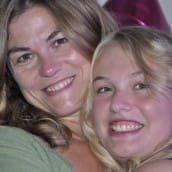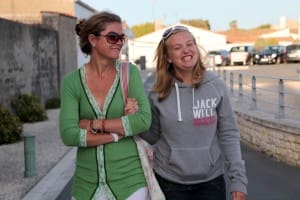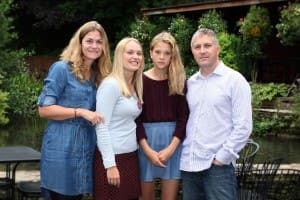Parent to Professional
… a mothers story

Early January 1996, just a day after New Year, my life changed forever. At the time, the bottom literally fell out of my world, finding out my daughter Maddie aged 16 months old had a rare neurological disease was a period of three or four months where my days were long, spent in a strange place, miles away from home, sleeping in a parents room (in bunk beds), with a small cupboard to store my clothes and having to queue up in the morning with other mothers to wash. Not to mention the regular interruptions of nurses in the middle of the night in search of someone’s mum because they were needed on the ward urgently.
Seventeen years later Maddie is now 19 years old, an inspiration, a tough cookie, having survived many roller coaster rides of pain, bouts  of depression, endless tests, hundreds and hundreds of needles, delivery of bad news, medicines galore and countless people intruding in her life.
of depression, endless tests, hundreds and hundreds of needles, delivery of bad news, medicines galore and countless people intruding in her life.
It took me a year to really get my life back to some sort of normality, by that I mean juggling work with having a sick child, the guilt, a broken marriage, being able to pay the bills now that I was a single parent and having to attend regular hospital appointments, arrange fortnightly infusions and supporting community nurses that cried every time they came to help me give Maddie her infusion as she had a needle phobia and had to be restrained.
In 1997 the feeling felt through the loss of control to protect my daughter, to take away her pain, the pain inside me caused by knowing this was caused by me and Maddie’s dad passing on our defected genes caused a fire so strong inside me that I knew that I had to find a way to feel like I was doing something.
I felt so alone, the literature was woolly, frightening, my friends were wonderful but they didn’t really know how I was feeling. I knew that there were other parents out there that were in the same position as me so I started to attend meetings of the UK Gauchers Association, I asked questions and in late 1997 I was asked to join the board of trustees to be a representative for neuronopathic Gaucher disease (the children’s form that affects the brain).
You could say the rest is history really; I always said that as long as Maddie was well I would do whatever I could to support other patients and their families with Gaucher disease. Despite a tough road, Maddie has remained stable and this has allowed me to travel around the UK and the World supporting parents and patients to access charitable treatment in countries where there isn’t any reimbursement programs through their Ministry of Health; assist in setting up new patient groups i.e. in Pakistan and supporting emerging patient groups; educating and supporting doctors to improve their knowledge of Gaucher disease and how best to treat Gaucher patients and pushing scientists and pharmaceutical companies to advance the boundaries of research into nGD which has proved to be hugely challenging and a very slow road. In 1996 when Maddie was diagnosed, gene therapy was 10 years away, 17 years later it is still 10 years away.
 My heart however has always laid with the patients and their families, whether its travelling 200 miles to hold a mother’s hand whilst she cries on my shoulder in pain as she watches her daughter disappear in front of her eyes, or spend the afternoon with a young women with Type III Gaucher disease who feels that life isn’t worth living. Patient support is where I feel I have been able to help others the most. We are a small UK community and throughout the world I have discovered many more small communities of nGD patients, some with treatment, many without, but knowing that you are not alone is a comfort in what is often a very lonely and uncertain life.
My heart however has always laid with the patients and their families, whether its travelling 200 miles to hold a mother’s hand whilst she cries on my shoulder in pain as she watches her daughter disappear in front of her eyes, or spend the afternoon with a young women with Type III Gaucher disease who feels that life isn’t worth living. Patient support is where I feel I have been able to help others the most. We are a small UK community and throughout the world I have discovered many more small communities of nGD patients, some with treatment, many without, but knowing that you are not alone is a comfort in what is often a very lonely and uncertain life.
As many treated nGD patients get older and too many untreated nGD patients lose their battle with Gaucher disease, the need for a cure has never been more critical. We live in a world where we now have four drugs for Gaucher disease, however none of them cross the blood brain barrier and the neurological aspects of the disease continues to burden these patients and their families lives, often taken too soon from this world. For those whom treatment has given them a life and a future, the disease continues to throw up many new challenges not seen before as these patients would have lost their lives many years ago, these include; seizures, mental health issues; challenges with education, employment, relationships and independence to name a few.
Sadly despite the increase in the number of drugs available for Gaucher Disease, the access for patients who live in countries without reimbursement has reached a critical point. The competition has diluted the market for the companies involved and they have had to limit the amount of charitable access they can contribute, therefore despite a huge amount of drug being produced patients are not being treated and doctors need support and guidance on how best to treat the ever growing number of patients who because of where they live in the world are not treated with ERT or SRT but who need to be supported clinically … sadly many of these are very young children who sadly pass away.
So I wear three hats; I am first and foremost Maddie’s mum; secondly I am the Chief Executive of the UK Gauchers Association and  thirdly the Executive Director of the European Gaucher Alliance (representing 40 member countries). This means that I help make up Maddie’s treatment; I sit in clinic and hold her hand; I meet with NHS England to ensure access to good clinical care and treatment for patients in the UK; I meet regularly with patients and their families in their homes especially newly diagnosed patients or patients in crisis; I stand by the graveside to say goodbye to friends and see our group get smaller and smaller and I travel to India, Russia, Bulgaria, the Middle East, Ukraine, Macedonia to meet with clinicians and Government officials to advise on how to develop their infrastructure to support patients.
thirdly the Executive Director of the European Gaucher Alliance (representing 40 member countries). This means that I help make up Maddie’s treatment; I sit in clinic and hold her hand; I meet with NHS England to ensure access to good clinical care and treatment for patients in the UK; I meet regularly with patients and their families in their homes especially newly diagnosed patients or patients in crisis; I stand by the graveside to say goodbye to friends and see our group get smaller and smaller and I travel to India, Russia, Bulgaria, the Middle East, Ukraine, Macedonia to meet with clinicians and Government officials to advise on how to develop their infrastructure to support patients.
So, Gaucher is my life, embedded in my soul, every day I think about all the people that I have been fortunate to meet, the amazing families, the dedicated doctors, the far thinking pharmaceutical companies, colleagues who work tirelessly in other countries in Gaucher disease and other lysosomal storage disorders who have been a tremendous support to me.
I believe it’s good to smile, things are changing, patients are better supported, but sometimes it’s hard, sometimes behind the smile is sadness that so many people are still suffering. We wish there was a cure – there is not – but the foundation of research has been built and there are many dedicated researchers and clinicians in the US, Europe and globally who are working collaboratively to find a cure. This is new and ever growing over recent years – and this provides hope for the future.
Tanya Collin-Histed
Chief Executive
The Gauchers Association
United Kingdom






